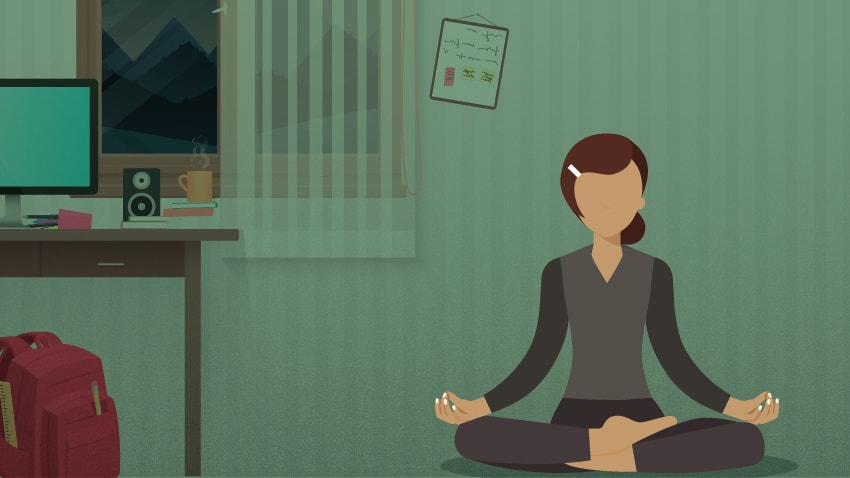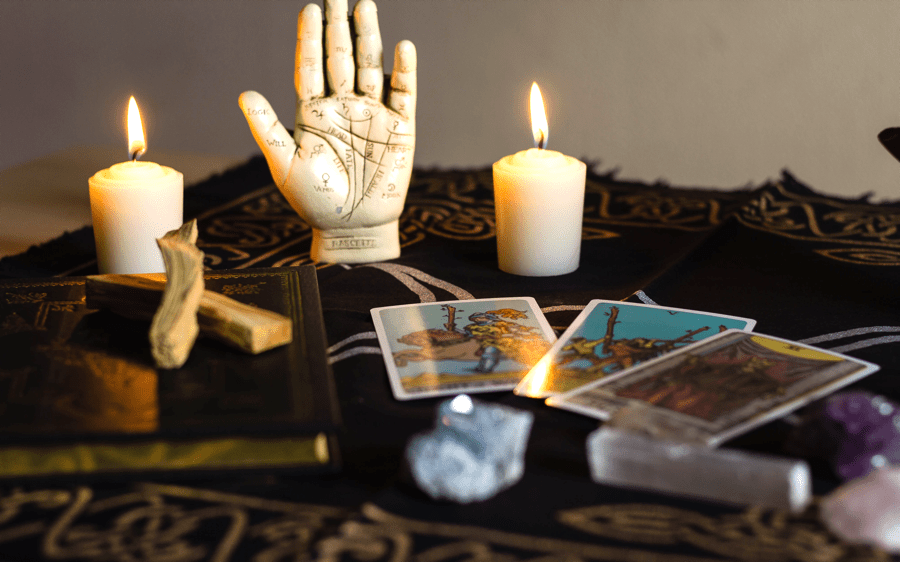Do you have a lucky number? What about a lucky item that you always carry with you? For some people, these items give them a sense of security and peace of mind. But for others, these superstitions can be a source of anxiety and stress. If your OCD is focused on superstitious beliefs and rituals, you are not alone. This type of OCD is known as superstitious OCD. In this blog post, we will discuss the symptoms, causes, and treatment options for superstitious OCD.
Contents
What Is Superstitious OCD?
 Superstitious OCD is an anxiety disorder where people develop obsessive thoughts and compulsive behaviors around superstitions, lucky charms, or other supernatural beliefs. People with this condition might avoid walking under ladders, black cats, or broken mirrors. They might feel the need to touch wood, knock on wood, or step on cracks in the sidewalk.
Superstitious OCD is an anxiety disorder where people develop obsessive thoughts and compulsive behaviors around superstitions, lucky charms, or other supernatural beliefs. People with this condition might avoid walking under ladders, black cats, or broken mirrors. They might feel the need to touch wood, knock on wood, or step on cracks in the sidewalk.
These rituals can become so time-consuming and disruptive that they interfere with daily life. In severe cases, people with superstitious OCD may become housebound due to their fear of unlucky objects or places.
Many different superstitions can trigger OCD symptoms. Some common ones include:
-Believing that certain numbers are lucky or unlucky
-Avoiding walking under ladders
-Knocking on wood for good luck
-Carrying a lucky charm
– Stepping on cracks in the sidewalk
Superstitious OCD can develop at any age, but it typically starts in childhood or adolescence. Boys are more likely to be diagnosed with this condition than girls. If you have superstitious OCD, you might feel like you’re the only one with these strange beliefs and behaviors. But it’s important to know that you’re not alone. Treatment can help you manage your symptoms and live a full life.
Signs and Symptoms of Superstitious OCD

There are many signs and symptoms of superstitious OCD. The most common include:
Strong belief in lucky and unlucky
There are certain numbers, colors, objects, or places that you believe are either lucky or unlucky. This belief is so strong that it affects your daily life. For example, you might only wear certain colors because you believe they will bring you good luck. There are also many things that you avoid because you believe they will bring you bad luck.
You might have lucky charms or rituals
Many people with superstitious OCD carry around lucky charms, such as a four-leaf clover or a rabbit’s foot. You might also have certain rituals that you do to bring yourself good luck. For example, you might knock on wood or step on cracks in the sidewalk. These rituals can become so time-consuming that they interfere with your daily life.
You are afraid of bad luck
You might be afraid of certain numbers, colors, objects, or places because you believe they will bring you bad luck. This fear can cause anxiety and lead to avoidance behaviors. For example, you might not want to walk under a ladder because you’re afraid it will bring you bad luck.
Your superstitions are causing distress
Your beliefs and behaviors around lucky and unlucky things are causing you distress. This might be because your rituals are taking up a lot of time or interfering with your daily life. Or, you might be worried that something bad will happen if you don’t follow your superstitions.
You avoid certain places or objects
You might start to avoid certain places or objects because you believe they are unlucky. For example, you might not want to walk under ladders or go near black cats. In severe cases, people with superstitious OCD become housebound due to their fear of unlucky objects or places.
Compulsive behaviors
You might have rituals that you feel like you need to do to avoid bad luck. These rituals can be time-consuming and interfere with your daily life. For example, you might feel like you need to touch wood or knock on wood every time you have a lucky thought.
Superstitious OCD can be a difficult condition to live with. But treatment can help you manage your symptoms and live a full life.
Causes of Superstitious OCD

Other than signs, many causes can be linked to the development of superstitious OCD. Some of these are:
Genetics
Genetics is one of the most important causes of superstitious OCD. If you have a family member with OCD, you’re more likely to develop the condition. This suggests that there might be a genetic component to this disorder. Many different genes have been linked to OCD, but more research is needed to understand how they play a role in the development of the condition.
Brain structure
People with OCD often have changes in their brain structure. One of these changes is an enlarged amygdala. The amygdala is responsible for fear and anxiety. This suggests that people with OCD might be more sensitive to fear and anxiety than people without the condition. Sometimes there may be a chemical imbalance in the brain which can also lead to OCD.
Environmental factors
Many different environmental factors can contribute to the development of OCD. One of these is stress. Stressful life events, such as a death in the family or a divorce, can trigger OCD symptoms. Another environmental factor is abuse. People who have been abused, either physically or sexually, are more likely to develop OCD than people who have not been abused.
Trauma
Trauma is one of the most common triggers for OCD. Many people with OCD have experienced some type of trauma, such as a car accident or a natural disaster. This trauma can be the trigger for OCD symptoms. There may be many other causes that have not been discovered yet and more research is needed to understand the development of this disorder.
Abuse
Abuse is not only physical. Emotional, sexual, and psychological abuse are also forms of maltreatment that can have serious long-term effects. While all forms of abuse are damaging, emotional abuse can be especially harmful because it can undermine a person’s sense of self-worth and ability to trust other people.
Negative Life-Events
Negative life events, such as the death of a loved one or a divorce, can trigger OCD symptoms. In some cases, people with OCD may even blame themselves for these events. These life events are also often accompanied by changes in family dynamics and routines. There may also be many new demands placed on the individual, which can be overwhelming.
Loss of Control
People with OCD often feel like they have lost control of their lives. This may be due to the amount of time and energy they spend on their compulsions and rituals. It can also be due to the way OCD affects their relationships and daily activities. OCD can make it difficult to keep a job or go to school, socialize with friends, or even take care of basic self-care tasks.
There are also many different types of OCD, each with its own unique set of symptoms and behaviors. However, some common themes often occur in people with this disorder.
Negative Impacts of Superstitious OCD

There are many negative impacts that superstitious OCD can have on a person’s life. Some of these are:
Isolation
Isolation is one of the most common negative impacts of OCD. People with OCD often avoid social situations and activities because they are afraid of their symptoms. This can lead to isolation and loneliness. There may be many things you want to do but can’t because of your OCD.
Anxiety
People with OCD often experience high levels of anxiety. This anxiety may be due to the fear of their symptoms or the fear of not being able to control their compulsions and rituals. This anxiety can also lead to panic attacks and other physical symptoms.
Depression
Depression is another common negative impact of OCD. People with OCD may become depressed because of the isolation, anxiety, and loss of control that this disorder can cause. Depression can also be caused by the guilt and shame that people with OCD often feel about their symptoms.
Missing Out on Life
People with OCD may miss out on many aspects of life. This is because OCD can take up a lot of time and energy. People with OCD may spend hours each day thinking about their symptoms or engaging in their compulsions and rituals. This can make it difficult to participate in activities that you enjoy or spend time with loved ones.
Suicidal Thoughts
Having OCD can also increase the risk of suicidal thoughts and attempts. This is because OCD can be very debilitating and cause a lot of suffering. People with OCD may feel like they can’t go on living with their symptoms. If you are having suicidal thoughts, it is important to get help from a mental health professional or a suicide hotline immediately.
Superstitious OCD can have many negative impacts on a person’s life. If you or someone you know has this disorder, it is important to seek help from a mental health professional.
Diagnosis of Superstitious OCD
Diagnosis of Superstitious OCD is difficult because there are no specific medical tests that can diagnose the disorder. A diagnosis is usually made based on a person’s self-reported symptoms and behaviors. The most important aspect of diagnosis is ruling out other possible causes of the symptoms. For example, some people with Superstitious OCD may also have other anxiety disorders, such as Generalized Anxiety Disorder or Panic Disorder.
There are many self-test for Superstitious OCD available online. However, these should not be used to diagnose the disorder. A professional evaluation by a mental health provider is necessary to make an accurate diagnosis.
If you think you may have Superstitious OCD, please consult with a mental health professional for proper diagnosis and treatment.
The diagnosis may also be made if the person has:
– intense fear or anxiety about a particular object, situation, or event
– excessive and unreasonable rituals or compulsions associated with the fear
– attempts to avoid the object, situation, or event that triggers the fear
– distress caused by the symptoms that interfere with work, school, or other aspects of life.
Also, the diagnosis of Superstitious OCD is made if the person realizes that their fear and rituals are excessive or unreasonable. However, they are still unable to control their symptoms.
Treatment of Superstitious OCD

Treating Superstitious OCD can be difficult as the beliefs and rituals are usually based on irrational thoughts. These are some treatment methods:
Medications
Medications are often used to treat other anxiety disorders, such as Generalized Anxiety Disorder or Panic Disorder. The most common type of medication used to treat Superstitious OCD is antidepressants. These can help reduce the symptoms of anxiety and improve mood.
Some of these medications that are used to treat Superstitious OCD include:
– selective serotonin reuptake inhibitors (SSRIs)
– serotonin and norepinephrine reuptake inhibitors (SNRIs)
– tricyclic antidepressants (TCAs)
Behavioral Therapy
Behavioral therapy is an effective treatment for many anxiety disorders. It can help people with Superstitious OCD learn how to manage their symptoms. Cognitive-behavioral therapy (CBT) is the most common type of behavioral therapy used to treat anxiety disorders. CBT can help people with Superstitious OCD identify and change the thoughts and behaviors that are causing their symptoms.
Exposure and Response Prevention (ERP) is a type of CBT that is often used to treat Superstitious OCD. ERP involves gradually exposing a person to the object, situation, or event that triggers their fear. This is done while teaching the person how to control their anxiety and resist the urge to perform compulsions.
Family Therapy
Family therapy can be helpful for people with Superstitious OCD. It can help families understand the disorder and learn how to support their loved ones. Family therapy can also help families identify and change any negative patterns of communication or behavior that may be making the symptoms worse. There may be many superstitious behaviors that a person with OCD may not even be aware of. Family members can help identify these behaviors and work on changing them.
Group Therapy
Group therapy can be helpful for people with Superstitious OCD. It can provide support and allow people to share their experiences with others who understand what they are going through. Group therapy can also help people learn new skills for managing their symptoms. Group therapy also enforces the idea that people with Superstitious OCD are not alone.
Individual Therapy
In addition to group therapy, individual therapy can be helpful for people with Superstitious OCD. It can provide a space for people to discuss their symptoms and experiences in a safe and confidential environment. Individual therapy can also help people learn new skills for managing their symptoms. It may also be helpful to see a therapist who specializes in treating anxiety disorders.
Psychodynamic Therapy
Psychodynamic therapy can be helpful for people with Superstitious OCD. It can provide a space for people to discuss their symptoms and experiences in a safe and confidential environment. Psychodynamic therapy can also help people learn new skills for managing their symptoms. It may also be helpful to see a therapist who specializes in treating anxiety disorders.
Support Groups
Support groups can be helpful for people with Superstitious OCD. They can provide support and allow people to share their experiences with others who understand what they are going through. Support groups can also help people learn new skills for managing their symptoms. Support groups also reinforce the idea that people with Superstitious OCD are not alone.
Self-Care
Self-care is important for people with Superstitious OCD. There are many things that people can do to help manage their symptoms. Some self-care tips that may be helpful include:
Practicing relaxation techniques
Many relaxation techniques can be helpful for people with Superstitious OCD. Relaxation techniques are also known as “stress management techniques.” Relaxation techniques can help people manage their anxiety and stress. Some relaxation techniques that may be helpful include:
Deep Breathing
Deep breathing is a simple but effective relaxation technique. It can help people with Superstitious OCD to control their anxiety and resist the urge to perform compulsions.
Practicing muscle relaxation
Progressive muscle relaxation is a relaxation technique that involves tensing and relaxing different muscle groups in the body. This can help people with Superstitious OCD to control their anxiety and resist the urge to perform compulsions.
Yoga
Yoga is a form of exercise that includes both physical and mental components. Also, Yoga can help people with Superstitious OCD to control their anxiety and resist the urge to perform compulsions.
Visualization
In visualization, people imagine calming scenes or situations. This can help people with Superstitious OCD to control their anxiety and resist the urge to perform compulsions.
Exercising regularly
Exercise can help reduce stress and anxiety. It can also help improve mood and sleep. People with Superstitious OCD should aim to exercise for at least 30 minutes on most days of the week. There may also be other benefits to exercise, such as improved self-esteem.
Eating healthy diet
Eating a healthy diet can help people with Superstitious OCD to control their anxiety and resist the urge to perform compulsions. A healthy diet includes plenty of fruits, vegetables, whole grains, and lean protein. It is also important to limit sugary and fatty foods.
Good sleep
Sleep is important for overall health and well-being. People with Superstitious OCD should aim to get at least seven hours of sleep each night. There are also many things that people can do to improve sleep quality, such as:
– Establishing a regular sleep schedule
– Creating a relaxing bedtime routine
– Limiting caffeine and alcohol before bed
– Avoiding electronics in the bedroom
Minimizing stress
There are many things that people can do to reduce stress. Some stress reduction techniques that may be helpful include:
– Time management skills
– Prioritizing tasks
– Planning ahead
– Saying “no” when necessary
– Asking for help when needed
– Taking breaks
Trying to live a normal life
People with Superstitious OCD need to try to live as normal of a life as possible. This may include:
– Going to work or school
– Spending time with friends and family
– Participating in activities that you enjoy
– Taking care of yourself emotionally and physically”
These are some treatment options for people with Superstitious OCD. It is important to talk to a doctor or mental health professional to figure out what treatment option is best for you.
Contact MantraCare for more help. If you or someone you know is struggling with Superstitious OCD, we can help. Contact us today to learn more about our services. We offer a free consultation so that we can learn more about your situation and see how we can help.
How To Prevent Superstitious OCD?

Preventing superstitious OCD can be difficult because it’s often intertwined with other mental health conditions. The best way to prevent it is to get treatment for underlying conditions such as anxiety and depression. If you have superstitious OCD, there are a few things you can do to manage your condition:
Challenge Your Beliefs
This may be difficult, but it’s important to question the things that you’re afraid of. Are they going to hurt you? What is the evidence that supports your beliefs? These beliefs are usually based on irrational fears, so it’s important to challenge them.
Expose Yourself To Your Fears
This may sound counter-intuitive, but it can help you to face your fears head-on. Through exposure therapy, you’ll gradually get used to the things that you’re afraid of and they’ll become less and less triggering over time. There may be many things that you’re afraid of but start with the ones that are most manageable and work your way up.
Know Your Triggers
Knowing what sets off your superstitious OCD can help prevent future episodes. If you know that certain things trigger your OCD, you can avoid them or be prepared for when they do happen.
Talk To Someone Who Understands
It can be helpful to talk to someone who understands what you’re going through. They may be able to offer support and advice on how to deal with your condition. Superstitious OCD can be a difficult thing to live with, but there is help available. You don’t have to go through this alone.
Try To Be Mindful
Mindfulness is a technique that can help you to be present at the moment and focus on your thoughts and feelings. This can help manage OCD, as it can help you to focus on the here and now rather than getting caught up in worries about the future.
Educate Yourself
It can be helpful to learn as much as you can about OCD. This will help you to understand your condition and how to manage it. There are many resources available, so have a look around and see what you can find.
Superstitious OCD can be a difficult thing to live with, but there are ways that you can manage it. By challenging your beliefs, exposure to therapy, and being mindful, you can start to take control of your life back from your OCD. Remember, you don’t have to go through this alone. There is help available if you need it.
How To Help Someone With Superstitious OCD?

Helping someone with superstitious OCD can be difficult. The person may not want to talk about their beliefs or rituals, and they may not want to change them. However, there are some things you can do to help:
Help Person To Know About Condition
Helping someone to understand their condition is important. Superstitious OCD can be difficult to understand, and the person may not know what is going on. There are many resources available, so have a look around and see what you can find.
Encourage The Person To Seek Help
If the person is willing to seek help, encourage them to do so. There are many treatment options available, and the sooner the person gets help, the better. This professional help can make a big difference in a person’s life.
MantraCare is a professional treatment center that specializes in helping people with OCD. If you or someone you know needs help, please don’t hesitate to contact us. We’re here to help!
Support The Person In Their Treatment
If the person is in treatment, support them in their journey. This may mean attending therapy sessions with them, or just being there for them when they need to talk. Treatment can be difficult, but it’s important to stick with it.
Be Patient
It can be difficult to deal with someone with superstitious OCD, but it’s important to be patient. The condition can be very confusing and frustrating, both for the person with OCD and for those around them. Try to remember that and be as understanding as you can.
Offer Support
Even if the person doesn’t want to talk about their OCD, offer your support. Let them know that you’re there for them and that you’re willing to help in any way you can. You don’t have to try to fix the person, just be there for them.
If you or someone you know is struggling with superstitious OCD, please don’t hesitate to reach out for help. There are many resources available, and treatment can make a big difference in a person’s life.
Conclusion
Superstitious OCD, or scrupulosity, is a type of OCD that is characterized by religious or moral obsessions and compulsions. People with this type of OCD may be obsessed with sinning, being damned, or offending God. They may also have compulsions around confession, praying, or performing rituals. While superstitious OCD can be debilitating, there are treatments available that can help. If you think you may have this type of OCD, please seek professional help.
While some people might view superstitious OCD as silly or irrational, it can be a very serious and disabling condition. If you think you might have this disorder, please seek professional help. There are treatments available that can make a big difference in your life.
If you’re struggling with mental health problems, know that you’re not alone. MantraCare is here to help you with these mental health disorders. We offer group therapy, self-help strategies, and professional help. Contact us today to learn more about how we can help you! Helping someone with these disorders can be difficult, but it is important to encourage professional treatment, listen and be supportive, and encourage healthy coping mechanisms. MantraCare is here to help you every step of the way. You can also book a therapy or download our free Android or iOS app.


